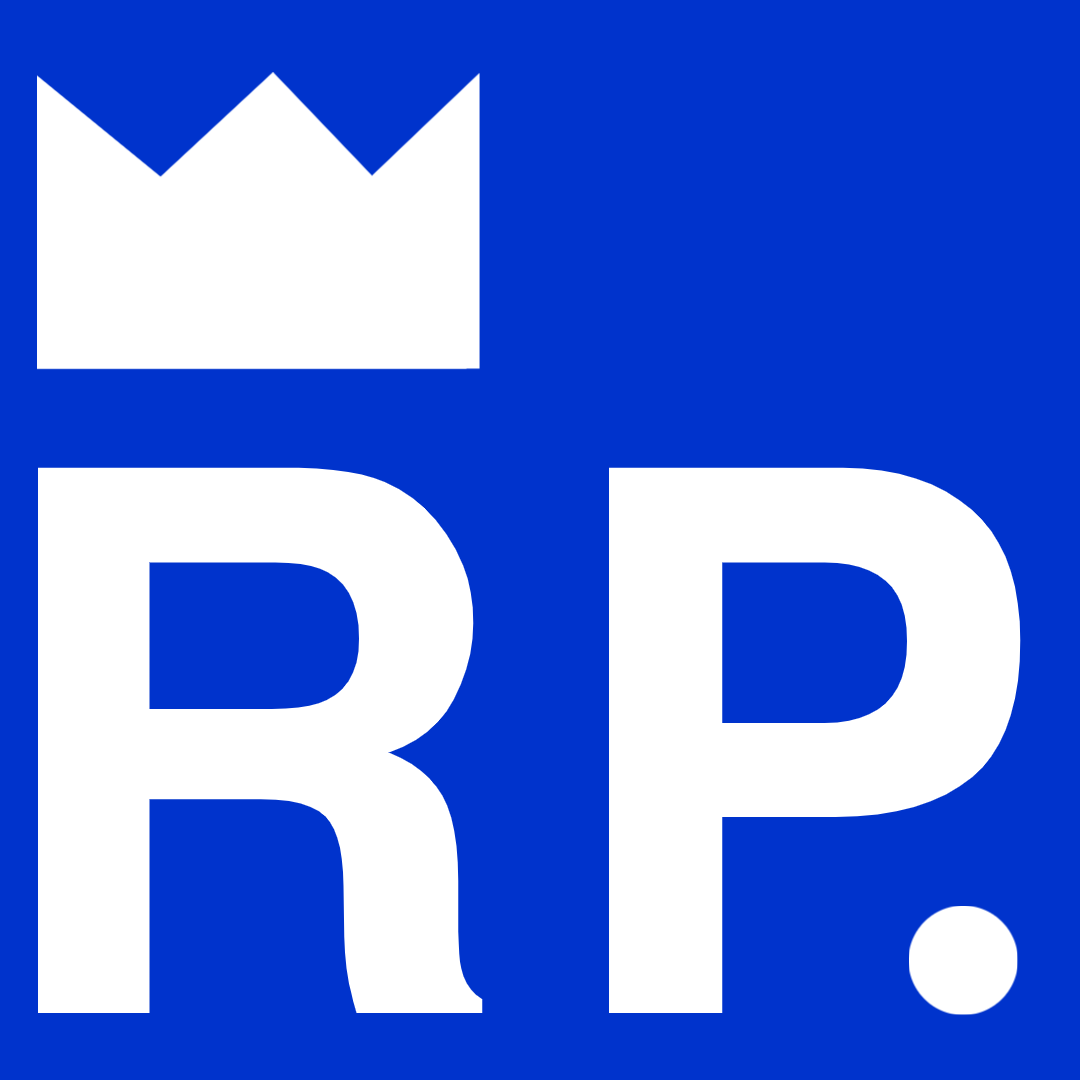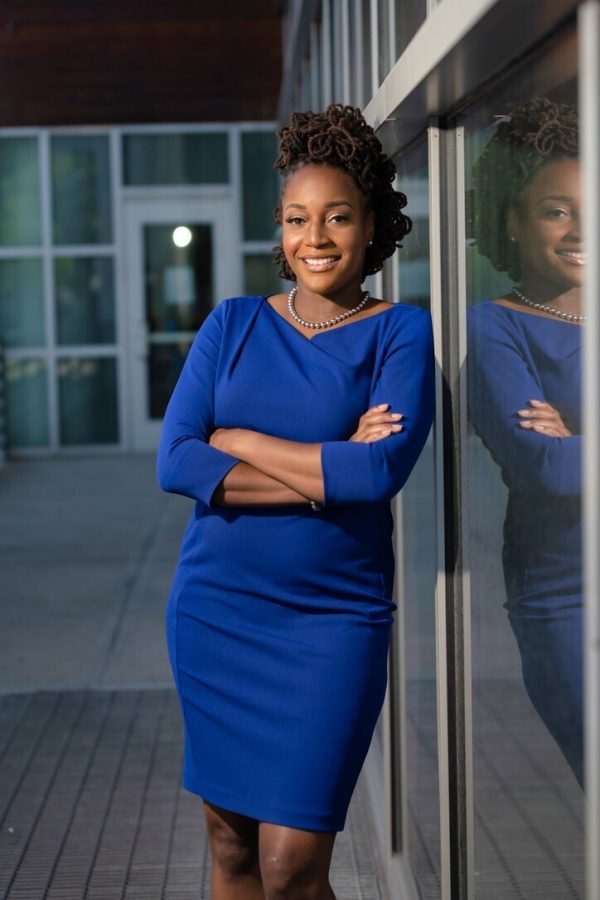A conversation with Principal Crystal Ballard on her unusual first weeks and vision for the future
Sep 25, 2020
Photo Provided by Crystal Ballard
Crystal Ballard outside of Hopkins High School. This is Principal Ballard’s first year as Principal at HHS.
In an interview with The Royal Page, the new HHS principal, Crystal Ballard, shed light on her hopes for the coming academic year.
Before arriving at HHS on Aug. 10, Principal Ballard served at the Osseo Area Schools where she worked as an assistant principal. She also has experience as an AVID teacher and coordinator as a special education teacher, and was the secondary assistant principal in the Minneapolis Public Schools district.
Ballard received a B.S. degree in Elementary and Special Education, and a Master’s degree in Deaf Education from the University of Minnesota. She also possesses a specialist degree in Education, designed for teachers considering administrative leadership. Ballard is also currently pursuing a Ph.D. in Educational Administration at the University of Minnesota.
The following is an interview with Ballard from Sept. 17. It has been edited for conciseness and clarity to allow for a genuine perspective on Ballard’s values for the 2020-2021 school year.
Why did you decide that HHS was a place you wanted to be?
“One of my colleagues told me about some openings in Hopkins. Before I become interested in any school district, I start to look at the goals of the district and the strategic plan.
One thing that’s important to me as a leader is racial equity work, and as I read and asked questions about Hopkins, I learned there was alignment between the school board and superintendent as it relates to the work that’s necessary in order to move Hopkins to a higher level. That’s one thing that was very attractive to me.”
The word “scholar” is a different phrase than we previously used to refer to students. Where did it come from and what are your reasons for using it?
“There are two parts that exist to this. The first piece is that I strongly believe there is power in words, and oftentimes you need to speak to something in order for something to be. This is the reason why there is so much research around affirmations and affirming. I believe in speaking life to scholars, both academically and socially emotionally.
When you come into the main entrance, if you look on the ceiling it says ‘scholars, leaders, and citizens.’ As you go into a school building, this is what we want for you all.
It isn’t necessarily my word, it’s the direction and path that was already laid before I got here. I’m just giving life to it. During my earlier sessions I was doing Q&As with our scholars, and a young lady asked me about it. And I asked, ‘Well how do you feel about it?’ and she shared, ‘Well I like it.’ She said ‘It makes me feel like I’m not less than, like I’m not under my teachers. We have a relationship and it just feels better. Like we’re in a partnership.’ And I thought that was amazing. Just through the power of words.”
What are some of the big goals you have for this school year? What are some of the actions you would want to take this school year?
“My large goal is to have an environment where scholars are able to feel safe socially emotionally, and psychologically, in order to thrive academically. In order to do that, and thinking about the goals of our district, it’s important for us to work around racial equity. This is why I felt that it was necessary at the beginning of the school year to have racial affinity groups. I put out a survey after [the groups] to talk about the frequency and how you all experienced it.
What’s most important for me is to center your voice, and center your experience. As we lead this school, it’s important to know what you’re thinking, what you’re feeling, and how you’re experiencing school in order to know what needs to happen differently in order to create the optimal experience for you.
[HHS is] an amazing place, there’s so much diversity, there are so many opportunities happening. I’m very proud of the work that our scholars did regarding research around the SRO [school resource officer] contract. What I’m most proud of is our scholars had an opportunity to collaborate, to engage, and essentially see the fruits of their labor. They were given a stage in order to have an impact at the policy level.
For me personally, I never had an experience like that. I just went to school, right? So I’m just really excited about the opportunities to engage and utilize the experiences and voices of our scholars to move our school in a direction that will allow us to achieve optimal results.”
Who has been the most helpful getting acclimated to the school environment, although we aren’t actually in school?
“Everyone has been so accommodating and available. I’m sometimes on the phone at 11 p.m. at night with questions. This morning I had a conversation with our associate superintendent at 7 a.m. because that was the only time my calendar would allow.
I remember I left here one night around 11 p.m., and as I left there was water pouring down the sidewalk. I was able to send a text message, and within 10 minutes I had replies. That level of responsiveness, especially for someone that’s new to the system, is very helpful.
Most contracts for principals start July 1st, and I started August 10th. Which is very late. I still have boxes in my office. But there have been so many people who have been so helpful and very timely with their help.
One thing that is important to acknowledge is Principal Julius Eromosele at NJH, and I came in [to Hopkins Publics Schools] together. He’s learning as I’m learning, and we’re constantly sharing those things.”
What’s your impression of the school after the first few days of interacting with the students and staff?
“It’s difficult to build relationships and know who people are in this format. In a regular school year, there is a staff meeting and I’m seeing people and able to walk through the halls and have conversations. Now it’s a Google Meet and only who I can see on my screen.
Thinking about where I’ve been professionally and where I am now, Hopkins is a much smaller school district and there is an expectation that there is involvement on not only the implementation side of things, but also the planning. We’re a part of plans that happen at the district level. We meet as operation teams, and as leadership teams, all the time.
My previous experience, because the district was so large, it wasn’t necessary for us to be a part of those teams. I’m finding that balance of doing all the things that are necessary to lead a school.”
How do you plan to make a lasting change at the school?
“I want a leadership team of scholars that works alongside the building and instructional leadership team. That’s huge because you all aren’t necessarily experts at instructional practice, right? However, you experience those practices. You know what works and what doesn’t work. You know what is good teaching, you know what is not so great teaching.
It’s important to have those feedback loops so we are constantly evolving to create the best possible outcomes for you all. In addition to that, I believe your voice should be a part of everything we do so I want that to be a part of the expectation.
I want you to feel comfortable questioning, asking for meetings, and organizing. Because this is your school, and your experience, and you only get one. We’re here, many of us, for several years. But you get three years of high school. It’s important for us to listen to you to make sure the experience for you and those who come after you are improved.”
Why do you think scholar’s voices are so important in our community and school?
“I couldn’t imagine it not being [important]. How can you have a system where you’re serving, and you’re not listening to the community you serve.
The most innovative solutions to problems come from you all. Your creativity. It’s important to be in a partnership and relationship for those things because although we have the ‘positional power,’ it doesn’t matter if we have this and aren’t using this to improve your experiences.
If you are leading, and no one is following you, are you really leading?”

